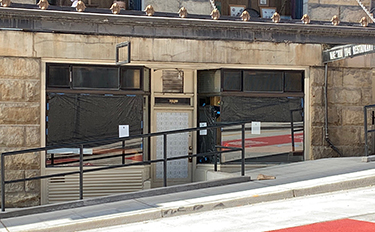|
Subscribe / Renew |
|
|
Contact Us |
|
| ► Subscribe to our Free Weekly Newsletter | |
| home | Welcome, sign in or click here to subscribe. | login |
Real Estate
| |
March 26, 2020
What will the local real estate industry look like after the pandemic?
Schwabe, Williamson & Wyatt

Wax
|

Katzaroff
|
In just a few short weeks, the novel coronavirus, COVID-19, has caused the deaths of thousands of people and the hospitalization of many more. It has also caused millions of people to self-isolate. In Seattle and throughout Washington, restaurants, gyms, and shops are closed and streets and office buildings are empty.
When the dust settles and Washington returns to work, what long-term impact will the coronavirus and related restrictions have on the local real estate industry? Here are the questions we are asking in these early days.
RETAIL
The coronavirus and related restrictions will challenge, if not destroy, a retail industry already struggling in the face of online competition. It seems inevitable that temporary closures will become permanent for too many retail establishments and that vacant storefronts will proliferate, much as they did during the last recession.
In the aftermath, will increased supply reduce rents, providing an opportunity for a new wave of retail entrepreneurs? Will fitness and entertainment uses be seen as risky, lest they be shut down again in a future pandemic?
National brands that do survive may attempt to manage costs by closing lower-performing stores, reducing footprints when possible, and perhaps limiting inventory. They may also experience lasting supply-chain challenges due to factory closures or conversions that make it difficult to obtain inventory in the immediate aftermath of the crisis.
RESTAURANTS
Seattle's thriving restaurant scene is an important part of the urban experience. Many restaurants are attempting to still make a go of it by offering delivery and takeout, but how long will that be sustainable? The volume of orders needed to cover operating expenses, even producing a limited menu, is significant.
And apart from the toll that coronavirus is likely to take on our existing restaurants, what will a post-COVID-19 restaurant look like? Will “ghost kitchens” — cooking facilities set up only for preparation of delivery-only meals and quickly gaining in popularity due to the proliferation of food delivery services — become a more attractive option than a seated dining room, which is more susceptible to a shutdown in a future public health crisis?
After we've become accustomed to “social distancing,” will happy hours and crowded bars be a thing of the past? Or will stir-crazy Seattleites, tired of home cooking and takeout (even if it's from Canlis) embrace restaurant-going once again when restrictions are lifted?
OFFICE
The past 10-15 years have seen average office densities increase dramatically, with many office workers — particularly in the tech industry — working in small cubicles or at open workstations. Maintaining social distance is impossible in such close quarters.
Will we see a trend towards lower office densities? Will employers, having weathered the current experiment in forced remote work, encourage some employees to work from home part time or full time to allow lower office densities without additional space? Or, if the experiment of remote work fails, will preferences and policies swing the other way?
HOSPITALITY
Due to conferences, conventions, tourism, cruise traffic, and business travel, the hospitality industry in Seattle had never been busier — then coronavirus grounded flights and canceled meetings and events.
If Zoom meetings can take the place of off-site meetings, will we still travel for business to the same extent we used to? Will the cruise industry bounce back, or will the memory of the Diamond Princess and stranded cruise passengers prove difficult to overcome?
If international travel restrictions remain in place after the domestic threat has passed, will Americans have an increased appetite for domestic travel? Will that include cruise traffic? Several industries in Seattle rely upon the millions of cruise passengers that visit during that bustling season.
RESIDENTIAL
The past decade or so has seen the revival of many urban centers, including Seattle's downtown and close-in neighborhoods, like Capitol Hill and South Lake Union. Luxury apartment buildings (and a few condominiums) have proliferated in these neighborhoods, boasting luxury amenities like movie screening rooms, state-of-the-art gyms and capacious rooftop decks.
This environment has proved attractive to millennial and Gen-Z office workers, as well as Gen-Xers and seniors looking to downsize.
But we wonder: Will the urban lifestyle continue to hold its charm after weeks or months in isolation in a 600-square-foot apartment or condo? When the restaurants and shops and museums are all closed, and it is impossible to keep proper 6-foot distances on urban sidewalks when walking your dog?
Some urban dwellers may find themselves thinking wistfully of a suburban home with an office and a large backyard (one of your authors included).
INDUSTRIAL
If there is one thing COVID-19 has taught us, it is that there is no such thing as too much toilet paper (or beans, pasta, oat milk or hand sanitizer). While some manufacturing uses may be paused, we are confident that warehousing and distributing will remain strong, and more important to the economy than ever, as we become increasingly dependent on delivery services for daily needs.
Of course, the impact of the coronavirus crisis will depend in part on the length that governmental restrictions remain in effect and what those restrictions look like. They say that it takes 21 days to create a new habit, and perhaps 66 days to make a new behavior automatic.
At the end of all of this, people will still want community, they will still want experiences, and they will still want thoughtful spaces to live, shop and work. Perhaps the best advice we can give at this time is to be thoughtful about how to design for the future.
Katherine Wax and Ken Katzaroff are real estate and construction industry group attorneys at Schwabe, Williamson & Wyatt.



